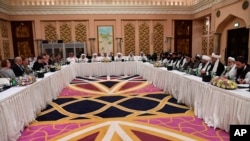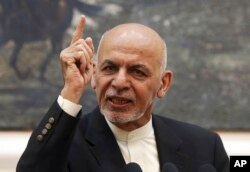The United States and the Taliban "agreed in draft" Tuesday on the withdrawal of foreign troops from Afghanistan in return for preventing Afghan soil from being used as a hub for terrorism.
The chief U.S. negotiator, Zalmay Khalilzad, made the announcement in a series of tweets at the end of his team's marathon 16 days of talks with Taliban representatives in Qatar.
"Despite ups and downs, we kept things on track and made real strides," said Khalilzad, the U.S. special representative for Afghanistan reconciliation.
This was the fifth round of discussions between the two sides since late fall, and it began on Feb. 25, with the Qatari capital of Doha serving as the host city.
"When the agreement in draft about a withdrawal timeline and effective counterterrorism measures is finalized, the Taliban and other Afghans, including the government, will begin intra-Afghan negotiations on a political settlement and comprehensive cease-fire," he explained.
Taliban spokesman Zabiullah Mujahid in a separate statement also noted that both sides achieved progress on the two issues.
Mujahid stressed the talks primarily focused on "how and when will all foreign forces exit Afghanistan and through what method? Similarly, how will the United States and her allies be given assurances about future Afghanistan?"
Both Taliban and American negotiators, he said, will reconvene soon on a mutually agreed date to build on the progress.
"For now, both sides will deliberate over the achieved progress, share it with their respective leaderships and prepare for the upcoming meeting," Mujahid said.
Khalilzad said he was headed back to Washington for discussions but emphasized "there is no final agreement until everything is agreed."
Afghan President Ashraf Ghani's government swiftly welcomed U.S. efforts toward promoting the peace process.
"We hope to witness a long-term comprehensive cease-fire with the Taliban, and hope that direct negotiations of Islamic Republic of Afghanistan and the Taliban begin soon," tweeted Presidential spokesman Haroon Chakhansuri.
Up to this point, the Ghani government has been skeptical and critical of the U.S.-Taliban meetings because it has been left out of the process.
The Taliban refuses to hold direct talks with Kabul unless U.S. and NATO forces withdraw from Afghanistan.
The insurgent group's spokesman Mujahid, while talking to Afghan media over the weekend, again ruled out talks with the Afghan government, rejecting those associated with it as "American puppets" and insisting if his group engages in such a process it would be tantamount to recognizing America's "18-year-old occupation" of Afghanistan.
Critics appeared uneasy at Khalilzad's announcement that the draft U.S.-Taliban agreement would be concluded before intra-Afghan negotiations begin.
"That sequence is a large concession to Taliban that may keep process moving but at cost of transferring leverage from U.S. to Taliban," tweeted Laurel Miller, former U.S. acting special representative for Afghanistan and Pakistan.
The United States invaded Afghanistan shortly after the Sept. 11, 2001 terrorist attacks and ousted the Taliban from power for sheltering al-Qaida leaders accused of orchestrating the violence.
Since then, however, the Taliban has regained control or contests more than 50 percent of Afghan territory and continues to inflict major battlefield setbacks on Afghan security forces being backed and trained by the American military.
President Donald Trump in his State of the Union address in January linked U.S. troop drawdown to the progress in talks with the Taliban.







